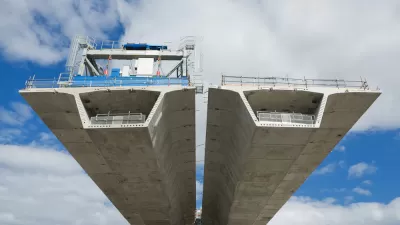To reduce greenhouse gas emissions by 25% below 1990 levels by 2020, Massachusetts hopes to tap federal funds to help enact a 'Pay As You Drive' auto insurance program to reduce transportation emissions.
"Data released by state officials on Wednesday (Dec. 29) indicate that more than one-third of the total greenhouse-gas (GHG) emissions in Massachusetts - 33 million metric tons in 2007 - come from the transportation sector. As part of the plan, Mr. Bowles (Secretary of Energy and Environmental Affairs) said, the state will start a pilot program giving drivers an incentive to cut back on unnecessary travel by linking car-insurance premiums to miles driven - a 'Pay As You Drive' program.
Congress has authorized $15 million in federal Transportation Department grants for such programs, money that could be used to ensure that lower-income drivers do not suffer an unequal burden."
The targets for the MA plan are 25% than that of California's AB 32, that call for reaching 1990 GHG emissions levels by 2020. MA will continue to engage in carbon trading for power plants through the northeast Regional Greenhouse Gas Initiative.
FULL STORY: Massachusetts Sets Targets to Slash Carbon Emissions

Trump Administration Could Effectively End Housing Voucher Program
Federal officials are eyeing major cuts to the Section 8 program that helps millions of low-income households pay rent.

Planetizen Federal Action Tracker
A weekly monitor of how Trump’s orders and actions are impacting planners and planning in America.

Ken Jennings Launches Transit Web Series
The Jeopardy champ wants you to ride public transit.

California Invests Additional $5M in Electric School Buses
The state wants to electrify all of its school bus fleets by 2035.

Austin Launches $2M Homelessness Prevention Fund
A new grant program from the city’s Homeless Strategy Office will fund rental assistance and supportive services.

Alabama School Forestry Initiative Brings Trees to Schoolyards
Trees can improve physical and mental health for students and commnity members.
Urban Design for Planners 1: Software Tools
This six-course series explores essential urban design concepts using open source software and equips planners with the tools they need to participate fully in the urban design process.
Planning for Universal Design
Learn the tools for implementing Universal Design in planning regulations.
Ada County Highway District
Clanton & Associates, Inc.
Jessamine County Fiscal Court
Institute for Housing and Urban Development Studies (IHS)
City of Grandview
Harvard GSD Executive Education
Toledo-Lucas County Plan Commissions
Salt Lake City
NYU Wagner Graduate School of Public Service



























